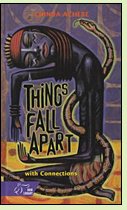Things Fall Apart
by Chinua Achebe
Reviewed by Margaret Donsbach Tomlinson

Things Fall Apart is a masterful novel about an African in the years before and after the arrival of the first white missionaries and colonizers. Okonkwo, the son of a lazy and irresponsible man, makes it his mission in life to be his father's opposite: hard-working, successful and respected. Alert to slights and challenges to his authority, Okonkwo is prepared to respond with violence, which he considers the most manly way to handle a threat, whether to himself or to his village. Other villagers are more easy-going; their distinct personalities and ways of relating to each other in the pre-Christian Ibo culture of the small village of Umuofia make the novel fascinating to read. Life revolves around the seasons of planting and harvest. "Yam, the king of crops, was a very exacting king. For three or four moons it demanded hard work and constant attention from cock-crow till the chickens went back to roost." The world around the village is full of threats. "Children were warned not to whistle at night for fear of evil spirits. Dangerous animals became even more sinister and uncanny in the dark. A snake was never called by its name at night, because it would hear."
When war looms between Umuofia and another village, Okonkwo is eager to fight, but the other villagers craft a compromise. The way he handles this compromise and continues to handle it, ignoring the warnings of village elders, sets him on the path to disaster. Like a classic Greek tragedy, the tale of Okonkwo's downfall shows how a man's flaws lead inexorably to destruction. Because Things Fall Apart is, above all, the story of a particular man in a particular time and place, it absorbs the reader in a way that a more general study of nineteenth-century Africa would not. At the same time, Okonkwo's story echoes the larger tragedy of colonialism and suggests that tragic flaws in African culture made it vulnerable to colonial exploitation. (1959, most editions between 150 and 225 pages)
More about Things Fall Apart at Powell's Books or Amazon.comOther novels about traditional cultures meeting European colonizers:
The Far Pavilions by M.M. Kaye (1978), about a half-English boy raised by a Hindu hill-woman in the north of India. See review or more info at Powell's Books
Malinche by Laura Esquivel (2006), about the South American Nahua woman who became the translator for and lover of Hernán Cortés during his conquest of the Aztec Empire. More info
The Fire of Origins by Emmanuel Dongala (original edition in French 1987, first English edition 2001), a mystical novel about a man born in Africa before European colonization who lives through the history of Africa into the present day. See review or more info at Powell's Books
Nonfiction about the history and culture of Nigeria:
Nigeria: A History by John Hatch (1971). More info
Folk Stories from Southern Nigeria West Africa by Elphinstone Dayrell (1910). More info
The Female King of Colonia Nigeria: Ahebi Ugbabe by Nwando Achebe (2011). More info
Online:
Insight into Igbo Culture, Igbo Language and Enugu, a website devoted to the culture of the Igbo people of Nigeria
Back to Historical Novels of Africa
Back to Directory of Book Reviews